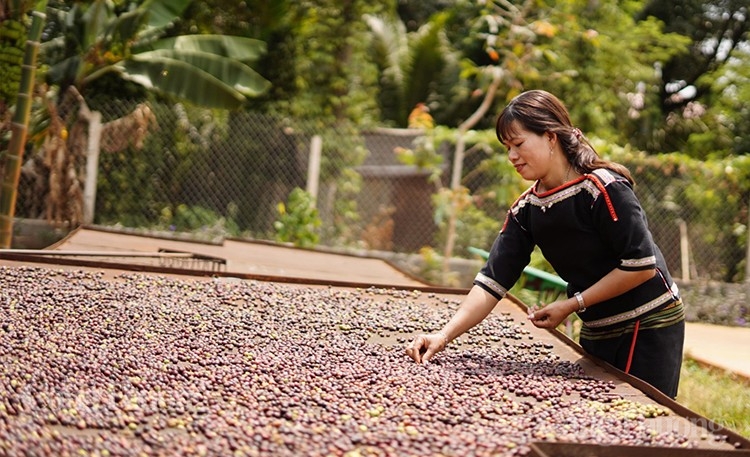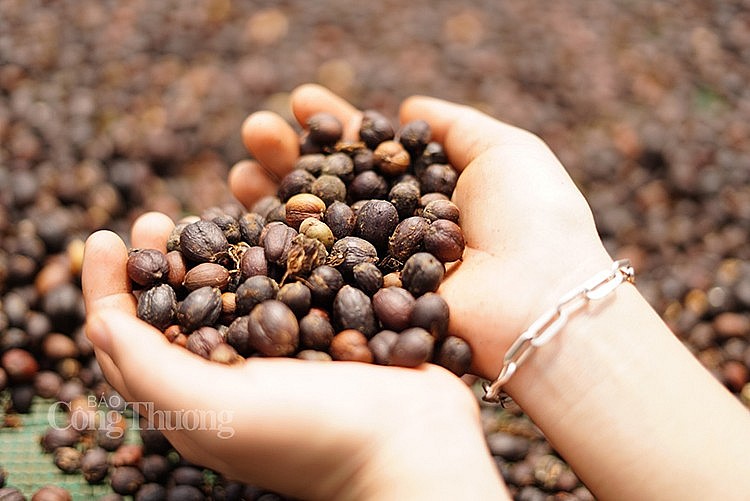 News
News
As an enterprise specializing in exporting coffee to many markets around the world, receiving information about the European Anti-Deforestation Regulation (EUDR) approved by the European Parliament and the European Council, Mr. Le Duc Huy, General Director of Dak Lak 2-9 Import-Export Company Limited (Simexco Dak Lak) is not too surprised and worried because the business has prepared before and in a short period of time.
 |
| Preliminary processing of coffee for export |
Sharing with a reporter from Industry and Trade Newspaper , Mr. Le Duc Huy said that in 2012, we were the first unit to cooperate with the Netherlands' IDH Sustainable Trade Initiative in implementing a project on agricultural development. sustainable industry in the Central Highlands, including Lam Dong...
"It's time for us to give back to the environment, return resources to the land," shared Mr. Le Duc Huy and said that the sustainable message that we put out has been deeply rooted in the system. Our 40 thousand farmers. Not competing with the forest but also bringing the forest back to the raw material area, the way we do it is to plant shade trees, windbreaks, and fruit trees to have sustainable landscape areas. And when the coffee tree is living in a good landscape environment, the fruit will be more delicious, sweeter and will have more sugar content in the fruit, the taste will also be more fragrant.
The new EU regulation with Simexco Dak Lak and many other coffee growers in Vietnam, besides challenges, is also an opportunity because EUDR will help Vietnamese coffee increase its competitiveness in the world market compared to other coffee growers. with countries that also grow coffee but have not been prepared for this issue.
Sharing the same opinion on this issue, Mr. Le Van Duc - Deputy Director of the Crop Production Department (Ministry of Agriculture and Rural Development) - said that the area of coffee planted from 2020 will be mainly intercropped with a high planting area. su. The area of coffee that is at high risk is only about 13,000 hectares (less than 10% of the coffee area is in the high-risk group).
After separating the forest and agricultural land boundaries. In order to trace the origin, Mr. Le Van Duc said that the certified areas only need to make an additional report to negotiate with the EU. Areas that do not have certification and do not have planting area codes need to accelerate the implementation of registration and issuance of planting area codes.
Assoc.Prof.Dr. Nguyen Ba Ngai, Vice President and General Secretary of the Vietnam Forest Owners Association (VIFORA), commented that the new European anti-deforestation regulations (EUDR ) introduced by Europe are not for the purpose of preventing commercial products. into the EU market, they want to have clean products, ensure legality and towards sustainable production and trade. Therefore, businesses should not see this as a challenge, but rather as problems that need to be overcome.
“Obviously, to meet this, businesses will take a lot of effort and expense, but they have to do it in order to integrate into the international market, only then can Vietnamese goods enter the market. and have a foothold in the EU market ” , Assoc. Nguyen Ba Ngai commented.
While large enterprises have prepared in advance, for small and medium enterprises, small farmers and vulnerable communities, it will be difficult to implement the EUDR regulation when the time comes. Businesses must apply is coming very close.
 |
| The challenge is also an opportunity for us to affirm the Vietnamese coffee brand |
For the coffee industry, Dr. Nguyen Phu Hung - Chairman of the Vietnam Forestry Science and Technology Association, asked the Ministry of Agriculture and Rural Development to request the EU to clarify the contents that need to be explained at the request of the EU in specific conditions in Vietnam. when the majority of coffee growers are small families.
At the same time, it is suggested that the Ministry of Agriculture and Rural Development make a written request to the EU to have a policy to support coffee growers and afforesters in preparation for building an information system and database to fulfill their responsibility for solving problems. process as well as possibly negotiating with the EU to implement a delay in implementation so that coffee and afforestation households can meet the requirements set by the EU.
In addition, the Ministry of Agriculture and Rural Development and international organizations from the EU are requested to support in organizing training courses to guide coffee growers in the short term on the contents required by the EU and in the long term. households plant forests with timber to sell to processing enterprises that export products to the EU.
On the business side, Mr. Le Duc Huy said, the challenge is also an opportunity for us to affirm the Vietnamese coffee brand. Simexco Dak Lak will review 40,000 coffee farmers to supply raw materials for businesses to meet the new requirements of the export market.
However, with the above new regulation, Mr. Le Duc Huy said that Vietnamese authorities need to closely monitor the requirements from the EU market as well as major import partners to plan the material area towards the direction of the EU market. sustainable, absolutely do not develop new coffee production areas in degraded or destroyed forested areas.
It is necessary to have an accurate forest status map system to clearly identify and avoid ambiguity, from which businesses have a basis to implement this regulation of the EU market. At the same time, it is necessary to promote communication so that people do not grow coffee on deforested land.
Meeting the standards will help increase the value of Vietnamese coffee beans many times, and at the same time increase income for farmers, no longer worrying about "good harvest, loss of value".
Mr. Nguyen Van Thao - Ambassador, Head of the Vietnamese Delegation to Belgium and the EU said that with a series of EU policies being issued and about to be issued, it will greatly affect Vietnam's exports . Therefore, on the part of state management agencies, it is also necessary to have research, preparation and recommendations to make appropriate policy adjustments, to avoid the EU applying it, then we will correct the policy. it's very difficult.
|
Mr. Tran Thanh Hai - Deputy Director of Import-Export Department (Ministry of Industry and Trade): Timber is a sensitive commodity in terms of origin, especially the EU promulgated the EU Deforestation-free Regulation (EUDR). In other words, they do not accept wood products that use materials from deforestation or grown on deforested land. The forests we have cleared and replanted are not accepted by the EU today. Like seafood being warned by the EU "yellow card" IUU, despite efforts to remove, but after 5 years, we have not been able to remove it. Therefore, the issue of raw materials, exporters need to pay close attention. |
Lesson 3: Transparency for Vietnamese agricultural and forestry products to penetrate deeply into the EU market